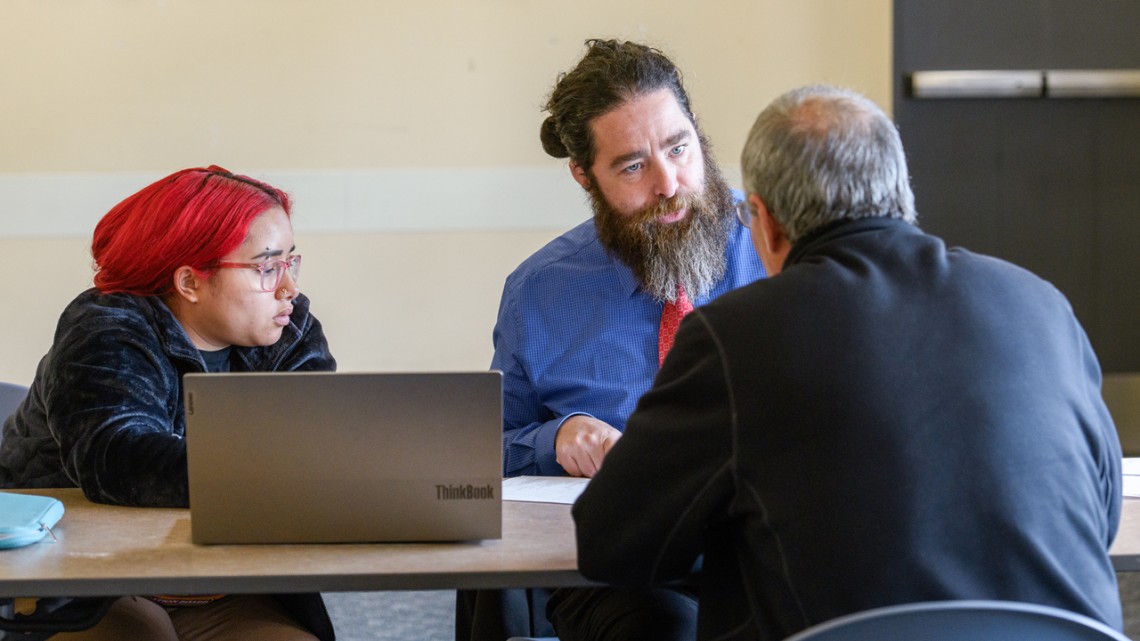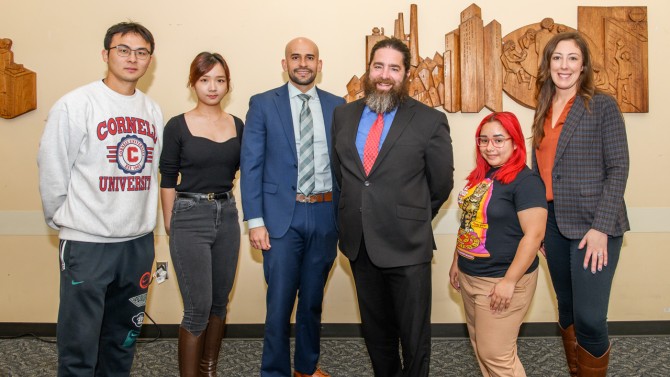
As part of the Pro Bono Legal Reentry Assistance program, Cornell Law School student Zaria Goicochea (left) and Jason Hoge (right), attorney from Legal Assistance of Western New York, work with a client at an Expungement Clinic at the Tompkins County Public Library on Oct. 23.
Students help those with criminal records gain clean slates
By Caitlin Hayes, Cornell Chronicle
One woman was denied assignments at her job because of a 30-year-old conviction. Another man couldn’t get a job at a nursing home, or anywhere that conducted a background check, because of a record that was decades old and incorrect. Another’s criminal record from years ago kept coming up in his search for a part-time job in retirement – even after a successful career with the state.
“For our client, getting his record sealed was also about the dignity of moving past this time in his life,” said Alecia Robins, a second-year law student who is participating in a new project that helps people with minor criminal histories review, correct and seal their records. “It takes him out of the position of having to apologize and of being measured by this one bad thing he’d done, rather than how much he’d contributed to his community past that point.”
A collaboration between Legal Assistance of Western New York (LawNY) and Cornell Law School, the Pro Bono Reentry Legal Assistance program aims to fill a gap in legal services in upstate New York for the millions of residents who can benefit from reviewing and correcting or sealing their arrest or criminal records. More than 40 Cornell Law School students and undergraduates have helped clients – disproportionately people of color – who struggle to find employment, to gain professional licensure, to find housing, even to keep custody of their children because of records that are nonviolent, decades old or riddled with errors.
“Everybody deserves a second chance,” said a 43-year-old client in the program who believes his record – with a misdemeanor charge from when he was a teenager and another from a decade ago – mischaracterizes him to employers. “I was with the wrong people at that time in my life, but I’m not some kind of harsh criminal who attacks people for no reason. I’ve made mistakes, and I’ve learned from my mistakes.”
Jason Hoge, lead attorney for LawNY’s reentry assistance programs, said there has been a vacuum in legal services for upstate New York clients with violations or misdemeanors on their criminal records, lower-level crimes that still hold them back and profoundly impact the trajectory of their lives.
“Any right you can think of is touched by a criminal record,” Hoge said. “The problem is so huge, and we absolutely need people to join us in this fight. Our clients have struggled in a criminal justice system that’s really set up to marginalize and disempower and disenfranchise them.”
Many people with criminal records may be eligible to have their records sealed – even more now, thanks to the Clean Slate Act, signed into law by Gov. Kathy Hochul on Nov. 16, which will automatically seal many records after a waiting period and expands eligibility for having records sealed.
“This is huge for us, but there will also be a lot of questions,” Hoge said. “Millions of people may have their records automatically sealed in the coming two years, but how will they know? They’ll need to review their records.”
For students, the project provides experience working with cases, clients and practicing lawyers, and allows them to make a direct difference in people’s lives.
“Our students want to get real casework experience, and then there’s this huge need in the community – so it’s a great marriage,” said Michaela Azemi, director of public interest and community engagement for the Law School. “Then we can also plug them into this idea of helping those who could never afford an attorney but who would never have these problems fixed without them – and they can make that a part of their practice down the line.”
Filling a need
The unemployment rate among people formerly convicted of crimes is 30% – Depression-era unemployment numbers, Hoge said. Furthermore, a 2014 study found that 40% to 60% of records contained a serious error. Hoge has worked with clients whose cases were marked as open when they were closed, whose crimes have been misidentified or misassigned; one client’s record reported she’d been convicted of a crime her ex-boyfriend committed.
But accessing criminal records requires navigating a complex state system and paying fees. Lawyers can help, but in the past these services have fallen in a gap between the work of public defenders and civil attorneys.
This is where Cornell students come in.
Students train with LawNY in how to help clients access their records, finding resources or ways to waive the fees, with some clients’ fees directly covered by an Engaged Opportunity Grant from the Einhorn Center for Community Engagement.
Once the records are obtained, LawNY assigns cases to teams of students, usually two law students and one undergraduate, who speak with the clients, sometimes individually or at a clinic run by LawNY. Students review the records for errors and determine if they’re eligible for sealing. If so, the students write an affidavit – a narrative statement from the perspective of the client, recounting the client’s life since arrest or conviction – to be reviewed by the court. Lawyers from Cooley, a private New York City-based firm, volunteer their time to oversee and sign off on students’ work.
For the 43-year-old client with two misdemeanors, the process was cathartic. “It was good to share my experience, like how to make it in this world, with a government that’s trying to make sure you don’t make it,” he said. “And once the record gets sealed, it’s a new chapter in my life.”
Law students also help in local outreach – collaborating with LawNY and the Ithaca-based nonprofit Alliance of Families for Justice (AFJ) to raise awareness of the services available.
“It’s been about getting to know the actual needs of the community and building trust, and it’s allowed me to give back,” said Allayne Thomas, a second-year law student who serves as a representative of the reentry program at a monthly group for formerly incarcerated women hosted by AFJ. “It’s been an incredible example of what I want my career to look like.”
The rewards
Students in the program said the opportunity to work with real cases and clients has been invaluable – even when the legal system itself has been frustrating.
“It’s been really critical in showing how our legal system works,” Robins said. “Theoretically, these rules and laws and procedures are supposed to make things fair, but in the real world, you’re seeing how many people, just from lack of access to time and money, don’t get full fairness and justice. Understanding that a judge is not infallible, that a system is not infallible, that the record itself is not infallible is really important.”
While the cases often take months to process, some students have already helped clients succeed. “When I heard that the application for my first client was approved, it was so exciting,” said Kate Sloan ’25, a student in the ILR School and a member of Phi Alpha Delta, a pre-law fraternity. “I thought back to all the things we’d talked about on the phone and how this is going to make a real difference in their life.”
Sloan and others said their work with the program has changed how they see their futures. “I used to think on a grand scale,” Sloan said, “like, how can I make the most change possible. But doing something like this has shown me how meaningful it can be to change just one person’s life.”
Media Contact
Get Cornell news delivered right to your inbox.
Subscribe


